|
|
|
Sort Order |
|
|
|
Items / Page
|
|
|
|
|
|
|
| Srl | Item |
| 1 |
ID:
176382
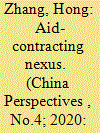

|
|
|
| 2 |
ID:
189938
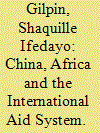

|
|
|
|
|
| Summary/Abstract |
The China–Africa relationship has received increased interest over the past few decades as scholars critically examine the challenge that China, in its quest for a closer strategic partnership with Africa, poses to the norms governing the neoliberal world order (NLWO). One crucial aspect of this is international aid, and how Chinese aid to Africa differs from Western aid. This paper argues that Chinese aid reduces the power of traditional aid donors to shape the development route of African countries. This new development finance ultimately breaks the monopoly of Western aid to decide how poor countries in the global ‘South’ develop. In doing so, the Sino–African aid relationship is challenging the current world order as it offers African states the possibility to decouple (or delink) themselves from the global economy. By challenging assumed neoliberal economic development fundamentals, this relationship, if harnessed correctly by African leaders, can pose longer-term ideological questions around the very set of ideas that underpin development itself, while enabling African states the policy space needed to pursue more sustainable development from an Afro-centric perspective. It is this possibility to delink, due to changing ideological fundamentals concerning economic development, that is the challenge China and Africa pose to the NLWO.
|
|
|
|
|
|
|
|
|
|
|
|
|
|
|
|
| 3 |
ID:
185235
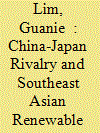

|
|
|
|
|
| Summary/Abstract |
In recent years, China and Japan have increasingly competed against each other over infrastructure provision in Southeast Asia, their near abroad. Through an analysis of energy infrastructure provision in Indonesia, this article argues that Indonesia has benefited from Chinese and Japanese financial resources in providing energy to otherwise remote and isolated communities. However, Indonesia’s domestic interest groups and its political economic structure have promoted nonrenewable energy adoption at the expense of renewable sources. Indeed, Indonesia’s demand for nonrenewable energy has opened up opportunities for both Chinese and Japanese firms. While Chinese firms have definitively grown their market share in nonrenewable energy infrastructure, especially coal-fired power plants, so too have their Japanese counterparts. The emphasis on coal-fired power has not only hindered renewable energy expansion, but also led to ecological damage. Furthermore, several Indonesian private firms with long-standing interests in coal mining and processing have forged collaborative ties with the Chinese and Japanese firms to enter the business of operating coal-fired power plants, while securing a captive market for their coal supplies. These findings illustrate that China-Japan competition is more complex than commonly portrayed, in addition to raising questions about Chinese and Japanese claims of a “green” Belt and Road Initiative and Partnership for Quality Infrastructure, respectively.
|
|
|
|
|
|
|
|
|
|
|
|
|
|
|
|
| 4 |
ID:
076903
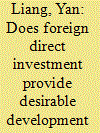

|
|
|
|
|
| Publication |
2007.
|
| Summary/Abstract |
Foreign direct investment (FDI) is often considered as a cost-effective and risk-reducing source for development finance. This paper, however, shows that FDI finance often entails underestimated risks and costs. FDI might react sensitively to business cycles and might not be as "permanent" as conventionally believed. FDI might also accelerate other forms of capital flow in times of financial difficulties and, hence, destabilize financial order. In addition to the risks, compensations to FDI and the high import-dependency of FDI-related trade lead to a considerable drain on the balance of payments. Moreover, the reliance on foreign capital for development finance is equivalent to building a Ponzi financing scheme and, therefore, is unsustainable. Given the fact that FDI financing is risky and costly and China does not lack savings, it is suggested in the present paper that China's efforts in attracting FDI should not aim at external capital provisioning
|
|
|
|
|
|
|
|
|
|
|
|
|
|
|
|
| 5 |
ID:
128467
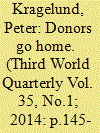

|
|
|
|
|
| Publication |
2014.
|
| Summary/Abstract |
The international development arena is currently subject to major changes in the geographies of power. In this article I analyse how and to what extent the (re)entry on the development scene of China, India and Brazil, together with increasing prices for primary commodities and improved access to international finance, has affected Zambia's political leverage to set, implement and fund its own developmental policies. I argue that, while real changes in external financial flows comparable to aid from these non-traditional state actors are still small, these actors' experience is providing Zambia with an alternative development model that combines purposive state intervention with market-based economic growth and integration into world markets. While Zambia may be taking the first steps in strengthening its 'sovereign frontier', the extent of this movement is still small and its development outcomes are far from assured.
|
|
|
|
|
|
|
|
|
|
|
|
|
|
|
|
| 6 |
ID:
143574
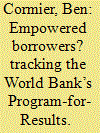

|
|
|
|
|
| Summary/Abstract |
The World Bank has developed a new lending instrument, called Program-for-Results (P4R). This instrument is notable because it emphasises borrower programmes and contexts, ostensibly shifting from universally applied Washington Consensus models. Why did the Bank develop P4R? First, theoretical grounds for a new Bank policy are outlined. Second, the context, formalisation and usage of P4R are analysed. Third, P4R’s possible futures are described, along with their implications for development lending theory and practice. Despite its embryonic status, scholars and practitioners will be able to learn about power in development lending by following the fate of P4R.
|
|
|
|
|
|
|
|
|
|
|
|
|
|
|
|
| 7 |
ID:
096849
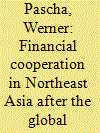

|
|
|
| 8 |
ID:
181839
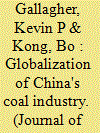

|
|
|
|
|
| Summary/Abstract |
This article examines the political economy of Chinese overseas development finance for coal fired power plants. In just over a decade China's two major policy banks provide more financing for overseas coal-fired power plant expansion than any other public financier in the world economy. We show how China's overseas surge in public financing for coal fired power plants is a function of a number of domestic push and foreign pull factors. Excess capacity, environmental regulation, and structural change are push factors that converge with rising demand for energy, pockets of coal abundance, and the lack of financing in Western capital markets for coal fired power plants. Fragmentation across the Chinese system and the demand for coal outside China's borders allow for a decline sector on the mainland to become a global Chinese powerhouse.
|
|
|
|
|
|
|
|
|
|
|
|
|
|
|
|
| 9 |
ID:
192840


|
|
|
| 10 |
ID:
162630
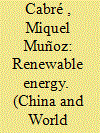

|
|
|
|
|
| Summary/Abstract |
This paper compares the global flows of Chinese overseas investment in power plants with renewable energy investment potential embodied in “Nationally Determined Contributions.” With over US$1tn (671 GW) in Nationally Determined Contributions renewable energy investment potential in developing countries, we estimate the total level of power plant investments from China's policy banks and commercial entities since the early 2000s at US$216bn (158 GW). Although past investment has mainly been directed at fossil fuels and hydroelectric power, we argue that China is uniquely poised to lead renewable energy global investments for three reasons: (i) China's solar and wind industries are globally competitive; (ii) Chinese policy banks can give domestic firms advantages in financing global expansion; and (iii) renewable energy investment opportunities still exist in developing countries with less sovereign risk than for traditional energy investments. The Chinese government should provide special incentives for the policy banks to capitalize on these investment opportunities by deploying Chinese solar and wind technologies to Belt and Road countries and beyond.
|
|
|
|
|
|
|
|
|
|
|
|
|
|
|
|
| 11 |
ID:
184646
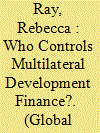

|
|
|
|
|
| Summary/Abstract |
Multilateral development banks (MDB s) are a growing source of development finance, with nearly two trillion dollars in assets. They have developed a wide array of governance structures, with implications for the distribution of members’ control over those assets. This paper measures that power distribution in 28 MDB s using Penrose-Banzhaf and Shapley-Shubik power indices and members’ relative voting power on MDB governance boards. It uses these calculations to create a typology of MDB governance structures: creditor-led MDB s distribute power among non-borrowers, core borrower-led MDB s distribute power among a few central borrowers, and mutual aid-oriented MDB s distribute power among a wide group of borrowers. Finally, it explores the impact of the creation of two new MDB s, the Asian Infrastructure Investment Bank and the New Development Bank, and finds that while they do not dramatically alter the global landscape they do allow significantly greater access to capital for some borrowers.
|
|
|
|
|
|
|
|
|
|
|
|
|
|
|
|
|
|
|
|
|